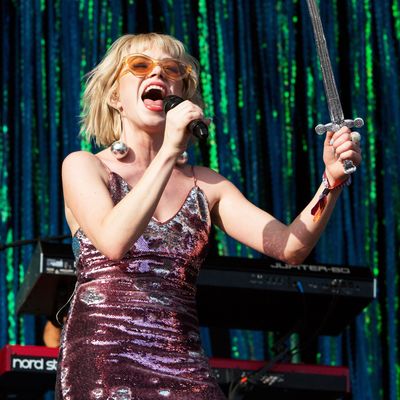
Early in 2016, a potential Republican candidate for the presidency of the United States tweeted a photo of a gun inscribed with his name. “Gov. Jeb Bush,” said the gun, and above the photo of the gun read the caption: “America.” He must have felt as though he needed to say it. His odds of winning the candidacy, let alone the presidency, were dwindling, his family’s dynastic sway drowned out by a brash, outrageous candidate with no history in politics at all. Jeb Bush seemed to limp his way through the election cycle. His campaign slogan was his own nickname punctuated with an exclamation point. The same month he tweeted the gun photo, he had to ask supporters to clap for a speech. His was not a virile campaign: thus, the gun.
Since the election of the 45th president, images of weaponry have surged through the social-media vernacular. The pictures that attract the most attention don’t look like Jeb’s. They’re not disembodied phalluses standing in for a failure to perform masculinity, nor inventories of survivalists’ “everyday carry” arms. The photos that move people look more like fashion shoots. A woman wearing a white dress and a semi-automatic rifle walks to her college graduation, the words “come and take it” printed on her cap. Another woman, also graduating from college, lifts her Trump shirt to reveal a handgun tucked into the waistband of her white jeans.
Popular on the right and popularly mocked among the left, these photos burn through the social web in part due to their glamour and sex appeal, and in part due to their outrageousness. These women are not at war; no one is coming to take their guns, and yet here they are, armed against an imaginary enemy, decorated for a fantasy. They are cosplaying. A gallows humor haunts the spectacle. If political tensions mount and nationwide violence does break out, these are the people who will have the guns.
This year, an adjacent genre of image has circulated sporadically through social media A pop star — almost always a woman — holds a weapon that has been Photoshopped into her hand. The falseness of the picture is obvious, as the source image is often recognizable as an album cover or a music-video screenshot; no one sees these memes and thinks they’re looking at a photo of a woman holding an actual gun. Sometimes text accompanies the image, usually a riff on the artist’s lyrics, adapted with blunt force to the imaginary scenario. “It’s mandatory to cry,” says a caption above a picture of Sophie aiming a handgun at the viewer, a joke on the artist’s single “It’s Okay to Cry.” “BITCH I SAID WE BELONG TOGETHER,” blares a tweet with a picture of Mariah Carey brandishing two pistols.
Unlike Kaitlin Bennett and Brenna Spencer, the college graduates who really do carry guns, the makers of these images know they are being ridiculous. And yet there is deep satisfaction to be derived from perpetuating these miniature fantasies. Last February, Twitter users jumped on a surrealist refrain: “Give Carly Rae Jepsen a sword.” It became an addictive phrase, then a delicious image: first a Photoshop, and later a reality, when a fan tossed her an inflatable broadsword at the singer’s Lollapalooza set last month. Dazzled by the meme’s manifestation, someone tweeted the photo of Carly Rae Jepsen and her sword alongside an illustration of Joan of Arc in a similar pose, as if divine intervention had descended on the Chicago music festival. Without the sword, Carly Rae is a pop star. With it, she becomes a spiritual leader.
Joan of Arc was not supposed to have a sword either. By default, images of armed women insinuate a breaking of femininity’s social enclosure, a trespass into the masculine realm of war. Men with guns come as no surprise — they are everywhere, in Army recruitment ads and popular video games — but a woman with a weapon is a shocking conceit. It comprised the bulk of the press campaign for the 2017 blockbuster Wonder Woman, a movie about a superhero who, unlike her male counterparts, needs a sword to speak the language of her power — her body alone won’t suffice. It stirs the air around Bennett and Spencer’s Twitter portraits. And it makes a clumsy Photoshop of a beloved singer with a gun irresistible fodder for a retweet.
If right-wing gun propaganda raises the specter of real violence in its poses and its taunts — “come and take it” — then fabricated images of pop singers with weapons transmute the language of those threats into camp, where guns can be deflated of their menace. That the images are often crudely collaged adds to their appeal. Charli XCX posing with a real gun on the cover of an album might press at the edges of the anxiety surrounding chronic gun violence in the United States. A preexisting Charli XCX album cover with a gun slapped on top of it casts the endemic into farce, relieving some of its pressure.
To rally behind a pop star brandishing an inflatable vinyl sword is inherently absurd, but so is the idea that the Second Amendment enables anyone to protect themselves from harm, let alone a tyrannical state. Both stories — Carly Rae Jepsen as champion of the just, and right-wing gun toters as defenders of the Constitution — emerge from a moment of stifled political stress. Giving weapons to pop stars is one strategy for laughing our way out of psychic deadlock. The state splits families and abuses children, militarized police kill civilians, the planet warms to apocalypse, and people in power do nothing. The actions available to people without power — organize, protest, vote — hardly feel as urgent or decisive as the moment demands. Crowds turn out, and still, children sleep in cages. Nothing happens, so women hold guns and dream.




